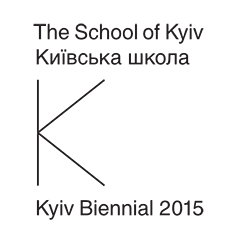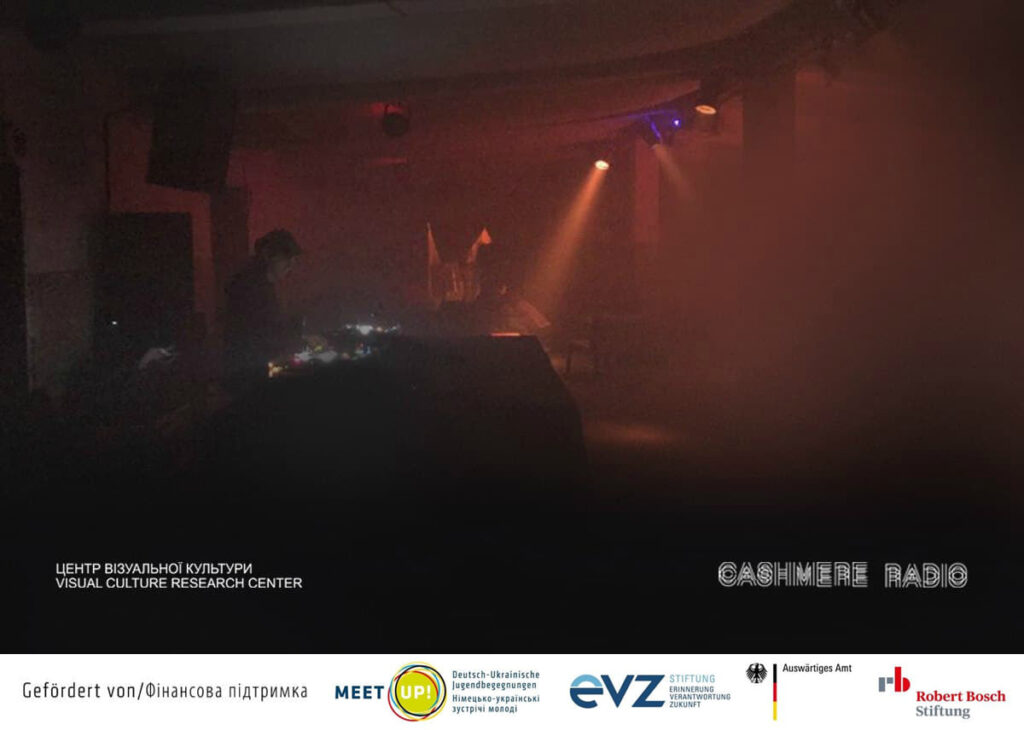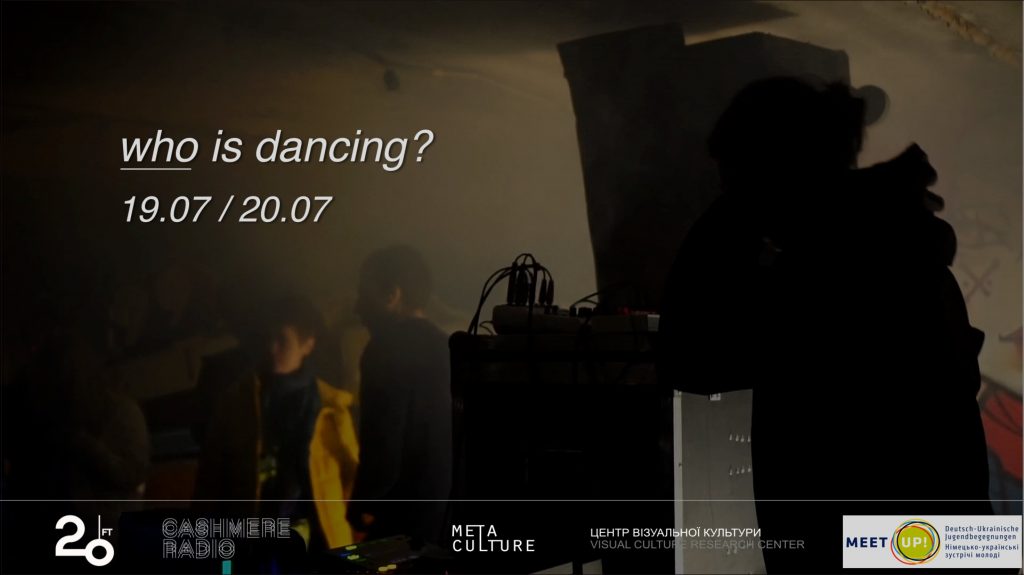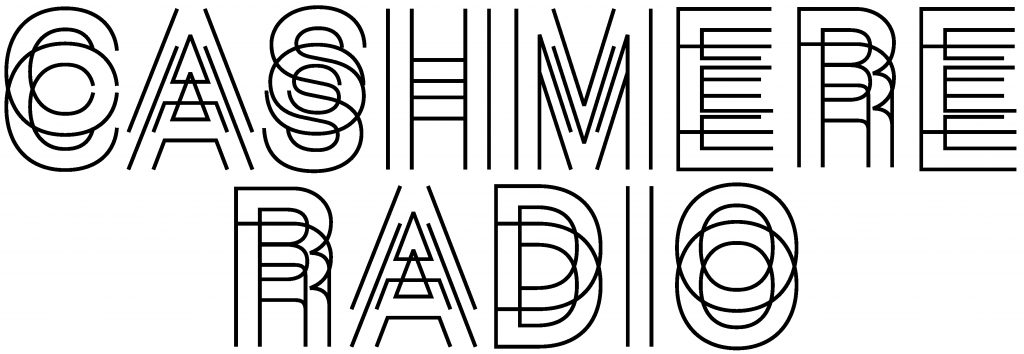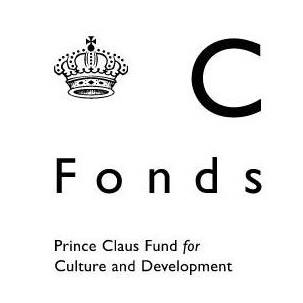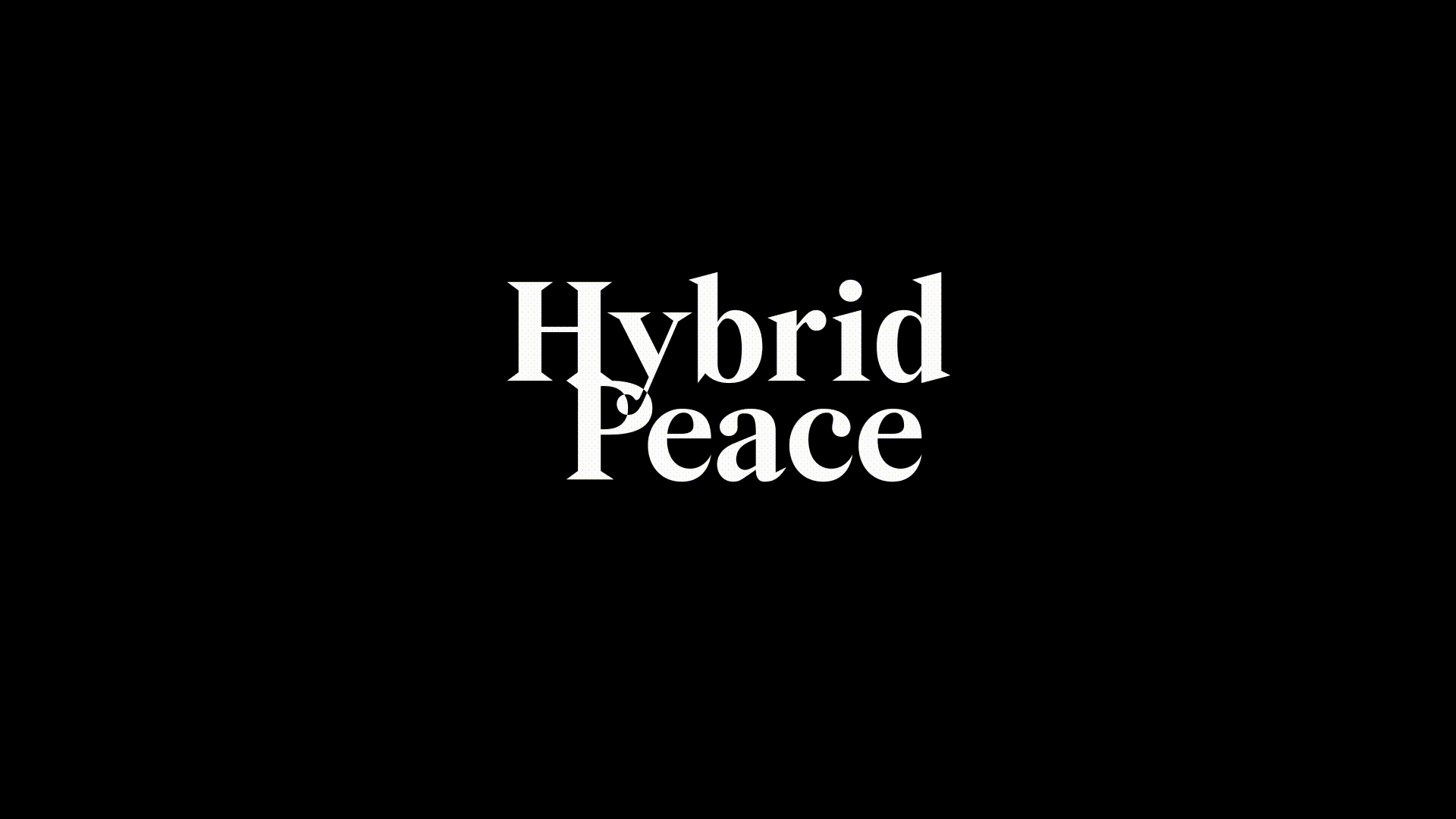Residency of Electronic Music “Nachtkultur/Нічна культура”. Second Part
November 23 – December 13, 2020
The second part of the Residency of Electronic Music “Nachtkultur / Нічна культура” has started. The aim of the project is to establish intercultural dialogue and engage young people in social action. The residency first took place in July 2019.
The global pandemic, against the backdrop of a political and economic crisis, has affected all spheres of life. Night culture, which only yesterday was proclaimed the most progressive, today has received the status of illegal and is under threat of extinction. The activities of independent cultural organizations were terminated, international cultural ties were interrupted, and a lack of understanding of the problems and values of the cultural sphere, as well as the lack of support from the state, confronts us with the question of whether an electronic music scene can survive COVID-19.
Given such negative socio-political circumstances, the priority of the second part of the residency of electronic music “Nachtkultur / Нічна культура” is to create conditions for continued international communication and cooperation. First of all, the format of the residency makes it possible to consider the state of emergency and try to jointly look for potential ways out of it.
For three weeks, twelve representatives of German and Ukrainian night culture will meet with the help of digital technologies, being in organized studios in Kyiv and Berlin. The residency will be accompanied by practical and theoretical seminars conducted by invited professionals, as well as a public series of radio programs created by the participants.
Organized by Cashmere Radio (Berlin, Germany) and Visual Culture Research Center (Kyiv, Ukraine)
Team: Lukas Grundmann, Kateryna Nikolenko, Nazarii Sovsun
The project was implemented within the “MEET UP! German-Ukrainian Youth Encounters” programme with support from the Foundation “Remembrance, Responsibility and Future” (EVZ). The opinions expressed by the authors are not necessarily those of the Foundation EVZ. The author is solely responsible for the content.
Culture at Crossroads: What Collaboration Do We Want in Eastern Europe?
Friday, 18 September 2020, 12:00 – 16:30 (CET), online within Biennale Matter of Art Prague 2020
East Europe Biennale Alliance (EEBA) presents ‘Culture at Crossroads: What Collaboration Do We Want in Eastern Europe?’ – an online symposium which will be streaming on Friday September 18th 2020 from 12 pm (CET). The symposium will be held in English and is organised by the founding members of EEBA – Biennale Matter of Art Prague, Biennale Warszawa, Kyiv Biennial and OFF-Biennale Budapest.
The event will be livestreamed on www.facebook.com/biennalematterofart/
Participants:
Tereza Stejskalová, Veronika Janatková, Dominika Trapp, Kateřina Smejkalová, Noemi Purkrábková, Zoltán Ginneli, Eszter Lázár, Eszter Szakács, Serge Klymko, Wolfgang Schwärzler, Vasyl Cherepanyn, Aleksandra Jach, Michał Dąbrowski, Bartek Frąckowiak, Marta Michalak
What should we expect from art and art institutions in the next few years or decades? What is their role at a time of a major social transformation? Why do we make or present art, for whom, and does it make sense to continue using the same formats and materials as before? What should art be focusing on and what difference can it make? These are old questions but they need to be asked whenever conditions are changing—and they are changing now, drastically. Without a doubt, the current situation leads us to rethink and reimagine the way art institutions, art practices, and artists operate. We ask these questions from a perspective of artists and curators who operate in the Eastern European region—the periphery of Europe. As we have witnessed again during the COVID-19 pandemic, the interconnected global challenges take specific shape in our region. How are we, the art/cultural sector (institutions, curators, critics, artists, producers) preparing ourselves to operate in the future? How should we rethink the ways of creation, production, and distribution of artworks, projects, and events?
Perhaps, as a consequence of the COVID-19 pandemic, the art world will become smaller, more local, more grounded in local communities. This can be a good thing in terms of the sustainability of both: the human and non-human lives on this planet. After all, the opportunities for artistic and curatorial mobility have never been distributed equally or justly. But the notion of local can also be a trap. Under the rule of conservative governments in our countries, critical art, critical artists and critical art institutions have become extremely precarious, in some cases even directly persecuted. International connections are a crucial resource of not only intellectual exchange and finances but also of moral and political support. In what forms, formats, and mediums will this international cooperation be able to continue? How can we share gestures of solidarity with our Eastern European collaborators, partners, friends, comrades in struggle?
The newly established East Europe Biennial Alliance, comprised of the Biennale Matter of Art in Prague, Biennale Warszawa, Kyiv Biennial, and OFF-Biennale Budapest, aims to propose a different narrative of the East European region and redefining the way cultural institutions collaborate. As contemporary biennials have become an important vehicle reaching new contexts and audiences, the Alliance is designed to enhance the role of biennials in shaping innovative forms of international solidarity, expanding socio-political imagination and elaborating alternative cultural solutions. The Alliance brings biennials together to develop a shared vision and regional collaboration producing cross-border meetings, public events and working on the common agenda for upcoming years.
PROGRAM
TECHNOLOGIES AND THE WORK OF COLLABORATION
12:00-12:10 Tereza Stejskalová & Veronika Janatková: Introduction
12:10-12:25 Kateřina Smejkalová
12:25-12:40 Noemi Purkrábková
12:40-12:50 Discussion
12:50-13:00 BreakII. DECOLONIZATION AND/OF COLLABORATION
13:00-13:15 Zoltán Ginelli: Decolonizing the Non-Colonizers? Eastern Europe in Global Colonialism and Semiperipheral Decolonialism
13:15-13:30 Eszter Lázár & Eszter Szakács: Practices of Alliance Building
13:30-13:45 Dominika Trapp: Peasants in Atmosphere
13:45-14:00 Discussion
14:00- 14:30 BreakIII. ECOLOGIES AND VISUAL POLITICS OF COLLABORATION
14:30-14:45 Aleksandra Jach & Michał Dąbrowski: How to Talk about the Climate Crisis?
14:45-15:00 Wolfgang Schwärzler: Building the East Europe Biennial Alliance’s Graphic Design.
15:15-15:30 Vasyl Cherepanyn & Serhiy Klymko. Political in Content, Visual in Form: Notes on Cultural Internationalism.
15:30-15:45 Bartek Frąckowiak & Marta Michalak: Eastern Europe: Three Scenarios for the Future of Transnational Collaboration in the Cultural Field
15:45-16:15 Discussion
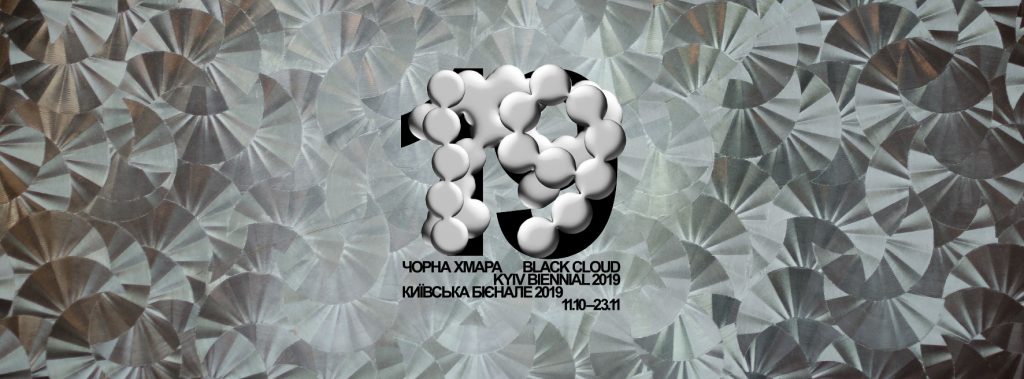
Чорна хмара – Київська бієнале 2019
Artificial intelligence, big data and Europe after Chernobyl: the program highlights of the Kyiv Biennial
Black Cloud – Kyiv Biennial 2019 will present a series of art projects and educational events focusing on the political and social role of modern technology. The main locations of the Biennial will be KPI Library and the House of Cinema.
Black Cloud, the third Kyiv Biennial of contemporary art, knowledge and politics organized by the Visual Culture Research Center, will take place on October 11 – November 23, 2019. The goal of the Kyiv Biennial 2019 is to reflect on social and political transformations in Eastern Europe over the past three decades, influenced by the Chernobyl catastrophe, the collapse of the Soviet Union, and the development of information and communications technology.
The Biennial’s program will incorporate an exhibition presenting the works of artists from Ukraine, Germany, Great Britain, India, Canada and other countries, as well as a public program featuring international researchers, scholars and activists. The exhibition will take place in KPI Library – a unique architectural masterpiece of the Soviet modernism which will become one of the locations of this year’s Kyiv Biennial. The events of the public program will also be held in the House of Cinema.
The Black Cloud exhibition will unite artists working with the topics of mass communication, artificial intelligence, environment and the Chernobyl catastrophe. In particular, it will feature a well-known installation “The Glass Room” by Tactical Tech collective, illustrating the mechanisms of personal data collection and the problem of privacy on the internet. A number of works will explore the liaisons between technology, politics and environment. For example, Susan Schuppli’s installation “Delay Decay” shows cover pages of the Pravda newspaper published in the 20-day gap between the Chernobyl nuclear accident and its public disclosure by the government, drawing parallels between radioactive threat and media manipulations. Other works question the anthropocentric perspective and address non-human life forms, such as Emilio Vavarella’s film composed of video fragments shot by animals.
The public program of the Kyiv Biennial 2019 will include around 15 lectures, presentations and panel discussions. For instance, international symposium “Communicative Militarism” focused on the phenomenon of cyberwar will take place on October 17-18, followed by a discussion on October 26-27 with Ukrainian experts and activists on how data is generated, used and protected online. A part of the public program called “Middle East Europe” will address contemporary historical conditions and ideological divisions in the countries of Eastern Europe and the Middle East that have become the battlefield for new authoritarianism and right-wing populism. It will consist of a series of lectures by the renowned philosophers, historians and political scientists, such as Geneviève Fraisse, Philipp Ther, Jan-Werner Müller, Sandro Mezzadra, Claus Offe, among others.
In 2019, Kyiv Biennial became part of the newly established East Europe Biennial Alliance, which also includes Biennale Matter of Art in Prague, Biennale Warszawa and OFF-Biennale Budapest.
Featured participants of the Kyiv Biennial 2019 include: Isabelle Alfonsi (France), Clemens Apprich (Germany), Arab Media Lab (Morocco), Keti Chukhrov (Russia), Geneviève Fraisse (France), Georgiy Kasianov (Ukraine), Oleksandr Kupnyi (Ukraine), Geert Lovink (Netherlands), Oliver Marchart (Austria), Svitlana Matviyenko (Canada), Sandro Mezzadra (Italy), Jan-Werner Müller (Germany/USA), Claus Offe (Germany), Niels ten Oever (Denmark), Nelly Pinkrah (Germany), Oleksiy Radynski (Ukraine), Raqs Media Collective (India), Kirill Savchenkov (Russia), Susan Schuppli (Great Britain), Tactical Tech (Germany), Aleksei Taruts (Russia), Philipp Ther (Austria), Emilio Vavarella (Italy), et al.
PROGRAM
October 11, Friday, 19:00 – KPI Library
“Black Cloud” exhibition opening
October 12, Saturday, 18:00 – KPI Library
“Час не чує, але він чекає на нас. On the nth Ground of the 6th Ocean: Ocean-Sensing Practices.” Performance by Kirill Savchenkov (Russia)
October 12, Saturday, 19:00 – KPI Library, Auditorium 6.5
“The Deregulation of Representations.” Lecture by Geneviève Fraisse (France)
October 13, Sunday, 19:00 – The House of Cinema, Blue hall
“Arab Stereotypes in Western Media. Hollywood as an Example: From Silent Movies to the Late 90’s and the Beginning of 2000.” Presentation by Abdelaziz Taleb (Arab Media Lab, Morocco)
October 17-18, Thursday-Friday, 18:30 – KPI Library, Auditorium 6.5
“Communicative Militarism.” Symposium curated by Svitlana Matviyenko (Canada)
October 19, Saturday, 19:00 – KPI Library, Auditorium 6.5
“History and Memory: Use and Abuse (Ukraine and Post-Communist World).” Lecture by Georgiy Kasianov (Ukraine)
October 24, Thursday, 19:00 – The House of Cinema, Blue hall
“From Neoliberalism to Illiberalism. The Great Transformation after 1989.” Lecture by Philipp Ther (Austria)
October 25, Friday, 19:00 – The House of Cinema, Blue hall
“Queer Art, Herstories and Emancipatory Strategies.” Talk by Isabelle Alfonsi (France)
October 26, Saturday, 14:00 – KPI Library, Auditorium 6.5
“(Toxic) State of Data: Data Politics and Data Policies in Ukraine.” Symposium curated by Digital Security Lab (Ukraine)
October 29, Tuesday, 19:00 – The House of Cinema, Blue hall
“Is there Really a Crisis of Democracy?” Lecture by Jan-Werner Müller (Germany/US)
November 2, Saturday, 19:00 – The House of Cinema, Blue hall
“Proliferating Borders in the Battlefield of Migration. Rethinking Freedom of Movement.” Lecture by Sandro Mezzadra (Italy)
November 15, Friday, 19:00 – The House of Cinema, Blue hall
“Conflictual Aesthetics. Artistic Activism and the Public Sphere.” Lecture by Oliver Marchart (Austria)
November 16, Saturday, 16:00 – The House of Cinema, Blue hall
“Borderlines in the East of Europe.” Symposium of the “Europe in the Middle East – The Middle East in Europe” (EUME) research program at the Forum Transregionale Studien (Germany)
November 17, Sunday, 19:00 – The House of Cinema, Blue hall
“Data Sonification.” Seminar and workshop by Daniel Siemaszko (Switzerland)
November 17-18, Sunday, 17:00, Monday, 19:00 – Metaculture
“Open Call (For Opinions).” Theatre exhibition by Studio Lajf (Czech Republic / Slovakia)
November 19, Tuesday, 19:00 – The House of Cinema, Blue hall
“Philosophy beyond Computation. On Evald Ilyenkov’s Critique of Artificial Intelligence.” Lecture by Keti Chukhrov (Russia)
November 22, Friday, 19:00 – The House of Cinema, Blue hall
“Transitioning from State Socialism to Democratic Capitalism. Observations on Ten Construction Sites.” Lecture by Claus Offe (Germany)
Locations:
The Scientific and Technical Library of the National Technical University of Ukraine “Igor Sikorsky Kyiv Polytechnic Institute” (37 prospect Peremohy, metro Politekhnichnyi Instytut).
The House of Cinema (6 Saksahanskoho Str., metro Palats Sportu).
Metaculture (31 Nyzhnioyurkivska Str., metro Tarasa Shevchenka).
Admission to all events is free of charge.
Institutional Partners: Biennale Praha (Czech Republic), Biennale Warszawa (Poland), European Alternatives (France), Forum Transregionale Studien (Germany), OFF-Biennale Budapest (Hungary), Transeuropa Festival 2019 (Italy), The Scientific and Technical Library of the National Technical University of Ukraine “Igor Sikorsky Kyiv Polytechnic Institute”, Digital Security Lab
With the Support of: ERSTE Foundation, Foundation for Arts Initiatives, Goethe-Institut Kiew, Prince Claus Fund, Ukrainian Cultural Foundation.
Opening of the Residency of Electronic Music «Nachtkultur / Нічна культура»
Public discussion «Who is dancing?»
19 July 2019, Friday, at 19:00
MetaCulture (Kyiv, 31 Nyzhnyoyurkivska street)
Kyiv’s music scene, despite its popularity abroad, remains in an uncertain position here in Ukraine. Attacks on ravers and LGBTQIs by far-right extremists, lack of adequate drug policies, precariousness of cultural activists and overall conservative public consensus destroy possibilities for asserting freedom of speech, inclusion and social diversity.
On the other hand, Berlin’s Love Parade-era drive was absorbed by reality of capitalism; the emancipative potential of the electronic music scene was used to create just another tourist artifact.
The acute shortage of political alternatives requires joint efforts of all stakeholders. Discussants will offer their critique of night culture and will also try to articulate its possible socio-political dimensions.
Participants: Lou Drago (Cashmere Radio), Lukas Grundmann (Cashmere Radio), Maya Baklanova (Tight Magazine, Схеmа), Yustyna Kravchuk (Visual Culture Research Center), moderator – Nazarii Sovsun (Visual Culture Research Center).
The event will be held in English.
Music event
20 July 2019, Saturday, at 19:00
20ft Radio (Kyiv, 31 Nyzhnyoyurkivska street)
(UA)
Acid Jordan b2b Tofudj
Diser Tape
NFNR
Sasha Very
YV
(GER)
Elissa Suckdog
Lou Drago
Lukas Grundmann
Mari Matsutoya
Ross Alexander
Wilted Woman (DJ Puddle)
Admission to all events will be free of charge.
“Nachtkultur / Нічна культура” is the residency of electronic music, which will be held from July 16 to July 28, 2019 in Kyiv based on the Audiodrag studio. It aims to foster intercultural dialogue and engage young people in social action. The residency is a “MEET UP! Pitching winner».
Organized by Cashmere Radio (Berlin, Germany) and Visual Culture Research Center (Kyiv, Ukriane)
Team: Lukas Grundmann, Artem Illin, Kateryna Nikolenko, Nazarii Sovsun
Partners: Audiodrag, MetaCulture, 20ft Radio.
Supported by German Federal Foreign Office and Robert Bosch Stiftung.
The project is implemented within the framework of the „MEET UP! Deutsch-ukrainische Jugendbegegnungen“ program.
Seasonal Works
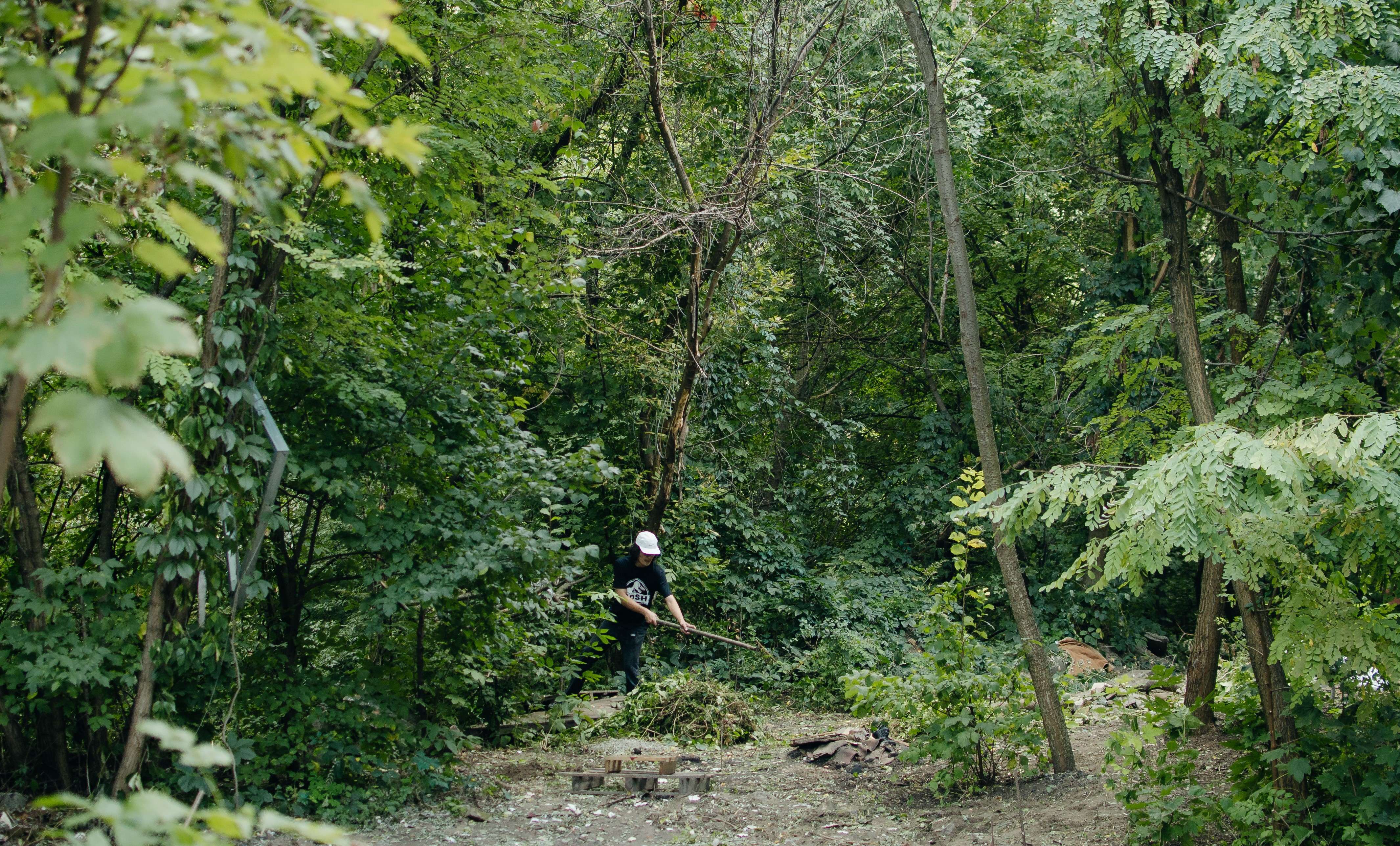
Photo by Oleksandr Kovalenko
June 18 – 23, 2019
On June 18, Visual Culture Research Center will open “Seasonal Works” session on the territory of the abandoned Petrivska Street, also known as “Хащі” (“Khashchee,” Ukrainian for “thickets”). For several years, “Хащі” has been functioning as a community-based cultural space, a place for the development of music counter-culture, graffiti, performative arts. This year’s program will include a greenery workshop, solar batteries installation and a picnic in the finale.
Solar power station will help to achieve a partial energy autonomy for “Хащі”. The construction process will be open for everyone who is interested in installing an own home SES.
The botanical workshop will be held by Nastya Kolenkova (plant explorer, green space worker) and Nina Direnko (designer of sustainable plant communities). It will continue last year’s exploration of possible ways of interaction of people and local plants. As part of the workshop, it is planned a planting of a new species and landscape design elements, without affecting the local ecosystem. Participants will also learn how invasive flora and weeds can be an alternative source of food and survival in the city.
Nina Direnko – sustainable plant communities designer
Anastasia Kolenkova – plant explorer, green space worker
With the Support of Prince Claus Fund
Hybrid Peace
25 March – 12 May 2019
Stroom, The Hague
Curated by Vasyl Cherepanyn, Visual Culture Research Center
The very basic idea of a united Europe was to establish peace on the continent – where there is Europe, there is peace. This task remains urgent on the political agenda. Yet the EU finds itself surrounded by a belt of wars at its south and east: in the face of technological developments and shifts in the geopolitical landscape, an ongoing hybrid war is establishing itself. Unlike ‘conventional’ warfare, hybrid warfare operates through image production, private armies, cyber warfare and political prisoners. In today’s international status quo, a regime of hybrid peace prevails, where the hybrid nature of war affects political and social conditions far beyond the agents involved in the war alone.
Vasyl Cheperanyn from Visual Culture Research Center (VCRC) presents the project Hybrid Peace from 25 March – 12 May 2019, staging installations, screenings, and discussions. Hybrid Peace explores the politicality of truth through visual art and forensic knowledge. Over the course of a 7-week period, the project will develop in multiple thematic directions around the concept of hybrid peace. A work-in-progress exhibition will be constructed, unfolding the concept of hybridity and its entanglements in Stroom’s exhibition space.
Although far removed from war zones, the Netherlands can now claim victims in the Russian – Ukrainian war through the MH17 tragedy. Cyber warfare means military ends are now met through the social means of image production and circulation. A surge of far-right populism has led to a perpetual state of exception for the migrants making their way to Europe through its borderlands. The Hague, City of Peace and Justice, should be at the forefront of recognizing the conditions of hybrid warfare, to imagine its alternative in the field of law, cultural production, and international relations.
With the participation of: Yuriy Hrytsyna (Ukraine), Angelina Kariakina (Ukraine), Oleksiy Radynski (Ukraine), Hito Steyerl (Germany), and Artur Żmijewski (Poland).
Emblem by Uliana Bychenkova, animation by Oleksiy Romanenko (Ukraine).
Hybrid Peace is initiated and realized by Vasyl Cherepanyn, VCRC.
Project: https://www.stroom.nl/activiteiten/tentoonstelling.php?t_id=4628020
Curatorial statement: https://www.stroom.nl/media/HybridPeace_concept.pdf
Special events: https://www.stroom.nl/paginas/pagina.php?pa_id=7661853
Visual Culture Research Center received Igor Zabel Award Grant 2018
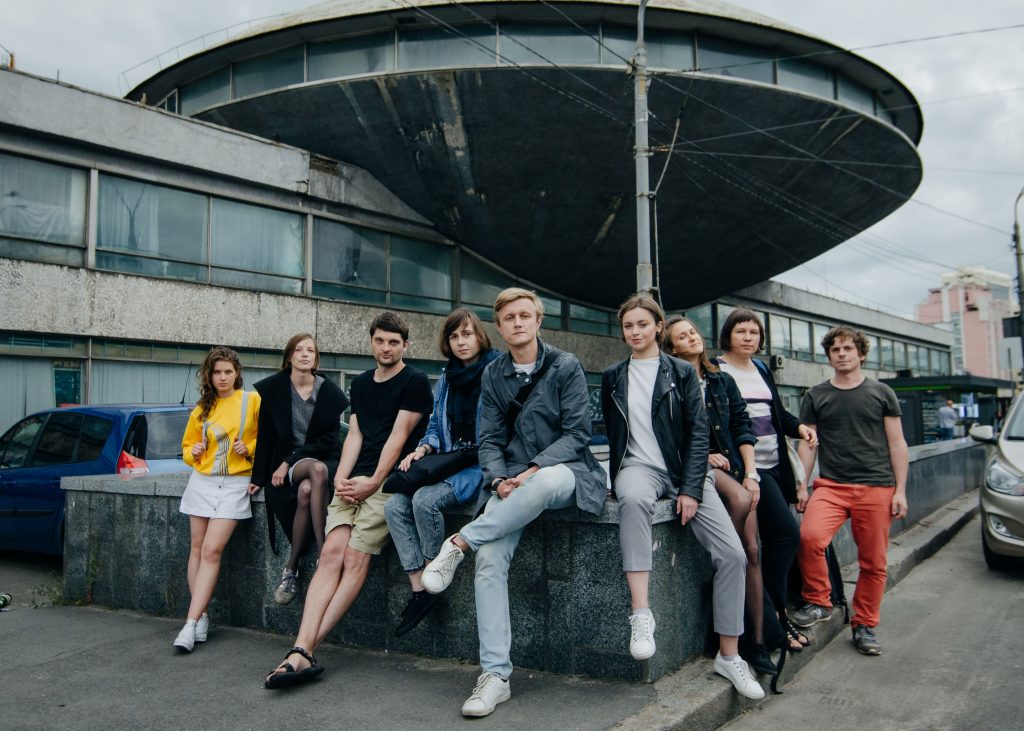
Photo by Oleksandr Kovalenko
Visual Culture Research Center received one of the award grants within the Igor Zabel Award for Culture and Theory 2018. The award ceremony will take place in Ljubljana on December 7.
The Igor Zabel Award for Culture and Theory acknowledges the exceptional achievements of cultural protagonists whose work supports, develops or investigates visual art and culture in Central, Eastern and South-Eastern Europe. Named in honour of the distinguished Slovenian curator and art historian Igor Zabel (1958–2005), the award has been conferred biennially since 2008.
The jury has awarded art historian and curator Joanna Mytkovska (Poland) for her work as the director of the Museum of Modern Art in Warsaw. Igor Zabel Award Grants are given to Edith Jeřábková (Czech Republic), Oberliht Association (Moldova) and the Visual Culture Research Center (Ukraine). The 2018 winners will be presented at an award ceremony: 7 December 2018, Moderna galerija, Ljubljana.
Visual Culture Research Center (VCRC) is an independent cultural institution based in Kyiv, Ukraine. It was founded in 2008 as a platform for collaboration between academic, artistic, and activist communities. In 2018 VCRC celebrates 10 years since the inception of the initiative engaged in publishing and artistic activities, scientific research, organization of public lectures, discussions, conferences and art exhibitions. In 2015, Visual Culture Research Center received the European Cultural Foundation’s Princess Margriet Award. VCRC was an organizer of The School of Kyiv – Kyiv Biennial 2015, curated by Hedwig Saxenhuber and Georg Schöllhammer (Austria). In 2017, VCRC organized and curated The Kyiv International – Kyiv Biennial 2017. In 2018, the VCRC collective curated the 10th Warsaw under Construction festival dividing its program between Warsaw and Kyiv within the Neighbours project.
NEIGHBORS. Public Program:
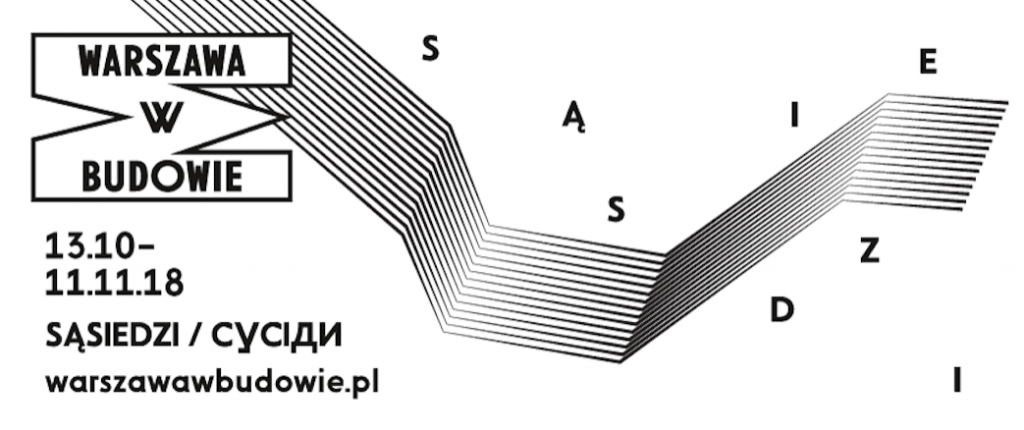 Museum of Modern Art
Museum of Modern Art
Warsaw, 3 Pańska St.
October 13, Saturday
19:00
“Neighbors”
Opening of the festival’s exhibition at Cepelia (99/101 Marszałkowska St.)
In Warsaw, as in many other Polish cities, it is becoming more and more likely that your neighbor next door is Ukrainian. Or, for that matter, Belorussian, Moldovan, Russian, Georgian, Uzbek etc. The growing influx of migrants from beyond the Eastern border means that Poland, for the first time since the end of WWII, ceases to be a mono-ethnic state. The 10th edition of Warsaw Under Construction reacts to this situation by decentralizing the festival, introducing a rupture within the exhibition’s logic that would reflect the changes taking place in Polish society on the level of the structure of the project itself.
21:30
Afterparty at barStudio (1 Plac Defilad)
October 14, Sunday
14:00
Curatorial guided tour through the festival’s exhibition at Cepelia by VCRC (in English with consecutive translation into Polish)
The festival’s exhibition can be read as a collection of diverse artistic approaches that take a timely look at social processes and how they’ve been shifted as the presence of new neighbors becomes increasingly apparent. The curators will draw to the foreground the artistic statements that refer to the situation in Ukraine as a result of the widespread discontent with the nation’s political situation, compounded by the ongoing military conflict, as well as the hurried ‘decommunization’ policy and the sweeping tide of ultra-nationalist movements.
16:00
Presentation of the Kyiv part of the festival by Natalia Neshevets and Serge Klymko (Ukraine) & discussion with Tomasz Świetlik (Poland) about interventions into semi-public space
The Kyiv part of the festival focused on urbanistic research and intervention into marginalized and forgotten routes of collective cohabitation in the city. It was located at the abandoned street that once connected the historical part of uphill city – Lvivska square with manufactory and workmen housing district of Hlybochytsa river valley. This route has fallen into oblivion with the collapse of the Soviet Union and became a spot of unrealized developing dreams, city fauna and a garage cooperative hosting a small creative community of graffiti writers, musicians and artists. The festival’s program reclaimed the place for public use providing a discursive space for collaboration between artists, scholars, urban activists and involving site-specific work, film screenings and series of workshops.
Film screening of Landslide (2016) by Oleksiy Radynski (Ukraine)
The film is about an attempt to build “a society, which will be radically different from everything else that surrounds us” (to quote the film’s protagonists). This attempt is taking place in the very center of Kyiv, in the area reclaimed by the forces of nature. Landslide, degradation of urban politics and disintegration of social ties led to the emergence of anarchic, uncontrolled enclave in the city center. That is how the idea of “utopia, here and now” was born. Representatives of street art, music scene and theater avant-garde take part in the making of this utopia.
18:00
“Door to Door”
Discussion on the topics of the festival’s exhibition with curators Oksana Briukhovetska, Anna Kravets, Hanna Tsyba (Ukraine) and artists Nikita Kadan, Dana Kosmina (Ukraine), Aleka Polis, Waldemar Tatarczuk (Poland)
Moderated by Ewa Sułek (Poland)
The idea of ‘neighbors’ in the exhibition is imagined in a state of constant flux, precarity and transformation, rather than permanent, stabilized co-existence. Curators of the project together with artists from Ukraine and Poland discuss the multiple perspectives explored in the show – ongoing flows of migration in the European cities, the ideological battle that evolves in the public space and the new rise of ethnic hostility, underrepresented participation of women in the processes of forming the city space – and how they are reflected in the Radio International sonic project.
The events will be held in English
October 15, Monday, 08:00
“Rosa Rotes”
Performance by Aleka Polis (Poland) with the participation of Dana Kosmina (Ukraine) in front of the Ministry of Family, Labor and Social Policy (1/3/5 Nowogrodzka St.)
An artistic protest against humiliating treatment of workers will take the form of washing the pavement with rags together with a Ukrainian who has higher education and is socially stigmatized for this type of work. The manifesto printed on the rags claims the unity and strengthening of the weak against depreciation of labor, mobbing, violence, exploitation and unequal distribution of goods through voicing the injustices that affect us. The documentation of the performance together with the used rags will be shown at the festival’s exhibition.
20 October, Saturday, 11:00
“Unwanted Heritage: Monuments of the Polish People’s Republic”
City walk through the places of missing and (yet) existing monuments of the Polish People’s Republic by Ewa Perlińska-Kobieżyńska (Poland)
Meeting: Plac Bankowy, at the monument to Juliusz Słowacki
Beginning from Bank Square (formerly Dzierżyński Square), we will visit sites where monuments from the communist era stood or are still standing. We will focus on monuments to figures (politicians and soldiers) important for the prior system as well as monuments of ‘gratitude’ to the Red Army. Once they served an ideological function, and over time became a fixed element of Warsaw’s public space. Now they are a rejected heritage. The topic is highly urgent following the introduction of a law calling for “removal from public space of monuments promoting communism or other totalitarian systems.”
21 October, Sunday
14:00
Guided tour through the festival’s exhibition at Cepelia (in Polish)
16:00
“Commercial Architecture of Post-War Warsaw”
Lecture by Ewa Perlińska-Kobieżyńska (Poland)
This year’s Warsaw Under Construction festival is being held in the space of the Cepelia pavilion. Its architecture and interior, originally serving commercial functions, pose the question of the context in which the building was created. The thaw of 1956 brought a new phase of modernist architecture as a synonym for a broader longed-for modernity. In commercial architecture, this included the lightly glazed structure of trade pavilions. The first pavilion, “Śródmieście,” was built on Marszałkowska Street, followed by others such as “Chemia” and “Cepelia.” The 1960s were also an era of construction experiments, as exemplified by the pavilions but also larger service buildings such as “Supersam.”
The events will be held in Polish
October 27-28, Saturday-Sunday
“Kyiv Under Construction”
Screenings and presentations of Ukrainian urban projects
27 October, Saturday, 17:00
Film screenings with the introduction by Vasyl Cherepanyn and Svitlana Shymko (Ukraine):
The Fall of Lenin (2017) by Svitlana Shymko
An ironic documentary film about the farewell to the phantoms of the USSR in Ukraine. The spiritual session with the ghost of Lenin guides us through our past, present and future. The film presents the dawn and the twilight of idols, and the curious afterlife of history’s ghosts.
Ма (2017) by Maria Stoyanova
Mom is feeding great tits from the window of her high-rise building in Mariupol, and growing queen apples in her summerhouse near the battle line. To show her simple life, she shoots videos on her small camera for her daughter, who lives in the capital and is hard to reach. To try to keep the conversation going, she feeds her overgrown child with sponge mushrooms and fairytales.
Varta1, Lviv, Ukraine (2016) by Yuriy Hrytsyna
An attempt to reconstruct the atmosphere and the reactions at the end of the Euromaidan, when activists in Lviv (Ukraine) started to perform law enforcement functions. The film uses the activist patrols’ walkie-talkie communications to ask questions about the nature of the revolution, law and self-organization. The film tries to look at the mundane spaces of the city, and to understand whether the historical and revolutionary uncertainty is still there.
28 October, Sunday
14:00
Guided tour through the festival’s exhibition at Cepelia (in Polish)
17:00
Presentations of the initiatives and researches on modernist architecture in Ukraine:
Soviet Modernism, Brutalism, Postmodernism architectural project by Oleksiy Bykov
Balcony Chic photo project by Oleksandr Burlaka
“The City and Its Landscape: Economic and Ideological Clashes Over Modernist Architecture and Memory in Kyiv and Warsaw”
Discussion with the participation of Oleksandr Burlaka, Oleksiy Bykov (Ukraine), Tomasz Fudala (Poland)
Moderated by Alicja Gzowska (Poland)
One of the focal points of the festival is the ways the notion of architecture, and the position of its creators, is currently transformed by local or transnational market mechanisms, or by past and present political ideologies. In Ukraine, anti-Soviet sentiment has risen since the government launched in 2015 a ‘decommunization’ campaign to get rid of the symbols of communist rule, which, apart from toppling Lenin statues and renaming cities and streets, also put country’s modernist heritage of the Soviet period under threat. A number of presentations and talks dealing with the urgency to preserve and protect Soviet modernist architecture will be accompanied with a series of film screenings on the topic of uprising and displacement in the city space. The discussants will also analyze the conditions of the Polish architectural heritage after 1989 and the changes of the urban landscape made for economic reasons or political purposes of ‘decommunization’.
The events will be held in English
November 3-4, Saturday-Sunday
“New Neighborhoods”
November 3, Saturday, 17:00
Presentation of “New Neighborhood / Moabit” initiative by Marina Naprushkina (Germany)
Moderated by Vasyl Cherepanyn (Ukraine)
An independent social and artistic space “New Neighborhood / Moabit” was founded by a Berlin-based artist, activist and author of a Belarussian origin Marina Naprushkina in 2013, at the time of the need to support refugees in the Moabit area. “New Neighborhood / Moabit” has developed into one of Berlin’s largest self-organized civil initiatives that creates a situation of “meeting” for old and new neighbors, people from different countries, with different social backgrounds, regardless of age, sexual orientation, and religion. It operates as an educational project in which the participants share their experiences and work on the creation of new forms of collective.
The event will be held in English
November 4, Sunday, 17:00
Discussion on Ukrainian migrants and refugee policies in Poland with the participation of Ignacy Jóźwiak, Miroslava Keryk, Antoni Wiesztort, Piotr Wójcik (Poland)
Moderated by Olena Babakowa (Poland)
The exponentially growing wave of migration from Ukraine to Poland is not a one-way street. It profoundly changes the economic, political and social functioning of both countries. Still, the significance of a swiftly enlarging Ukrainian community in Poland goes beyond mere numbers. The Polish government is bragging about its ‘acceptance of one million Ukrainian refugees’, although the real number of accepted refugees from Ukraine is in single digits. The rest should be qualified as labor migrants, but they are used as a convenient shield to evade the EU migrant quotas. ‘The Ukrainians’ are becoming a metaphorical, mythic community – even though the Polish economy relies to a great extent on their underpaid labor. The participants will discuss the contradictions of the Polish migration policy revealing the discontents of the EU Southern and Eastern neighborhood Ersatzpolitik.
The event will be held in Polish
November 10, Saturday
16:00
“Anti-Communism Deconstructed”
A symposium with the participation of Jodi Dean (USA), Maciej Gdula (Poland), David Ost (USA), Jan Sowa (Poland)
Moderated by Vasyl Cherepanyn (Ukraine)
A spectre is haunting Europe – the spectre of communism. All the powers of old Europe have entered into a holy alliance to exorcise this spectre: Merkel and Putin, Orbán and Macron, right-wing radicals and Brexiteers. From ‘decommunization’ in Ukraine and Poland to Germany’s “GDR has never existed”, from counter-revolutionary authoritarian regimes in Russia and Turkey to ruling populists in Austria and Italy communism seems to be treated and fought against as if it was not a symbolic remnant from the half-forgotten period before the proclaimed ‘end of history’ but a living ideological enemy still present on the political agenda. Perhaps, it is this anti-communism without communists that serves as a common negative signifier of all the political trends usually gathered today under the term ‘illiberalism’. What are the social drives and class background of such a widespread ressentiment? How is declared anti-communism paving the path to neo-fascism normalizing newly emerged avatars of the old ideologies of hatred? Why is it needed in today’s discriminatory practices in the entourage of anti-migrant consensus and anti-Semitic backlash? By clashing with the political forces that define the current status quo on a global scale, the discussants will scrutinize the European unconscious in its present mode.
19:00
“Communism’s Coming Home”
Film screening of Ceremony (2017) and talk by Phil Collins (Great Britain)
Moderated by Vasyl Cherepanyn (Ukraine)
A documentary film following the journey of a 1970 statue of Friedrich Engels from a village in Ukraine – removed from public view as part of the process of ‘decommunization’ – to Manchester, where it has been installed in the city center as a permanent monument. Engels lived in Manchester for over twenty years, and the experiences from his first stay in the city (between 1842 and 1844) informed his renowned 1845 treatise The Condition of the Working Class in England. The travelogue is combined with the footage from the day of the statue’s inauguration in July 2017 at a large scale live event and stories of today’s workers whom Phil Collins met over the course of a year. Artist’s relocation gesture has launched a series of debates on the legacy of Engels and relevance of communist thought in post-Brexit Europe and beyond.
The events will be held in English
11 November, Sunday
“Hasn’t Yet Died”
Finnisage of the festival
14:00
Guided tour through the festival’s exhibition at Cepelia (in Polish)
16:00
Curatorial guided tour through the festival’s exhibition at Cepelia by VCRC (in English with consecutive translation into Polish)
The festival’s exhibition can be read as a collection of diverse artistic approaches that take a timely look at social processes and how they’ve been shifted as the presence of new neighbors becomes increasingly apparent. The curators will draw to the foreground the artistic statements that refer to the situation in Ukraine as a result of the widespread discontent with the nation’s political situation, compounded by the ongoing military conflict, as well as the hurried ‘decommunization’ policy and the sweeping tide of ultra-nationalist movements.
Curated by Vasyl Cherepanyn (Visual Culture Research Center, Kyiv) and Szymon Maliborski (Museum of Modern Art in Warsaw)
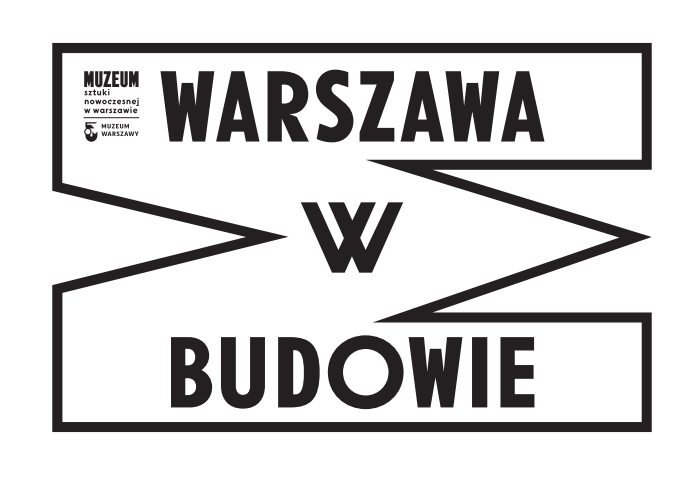
![]()
![]()
NEIGHBOURS exhibition
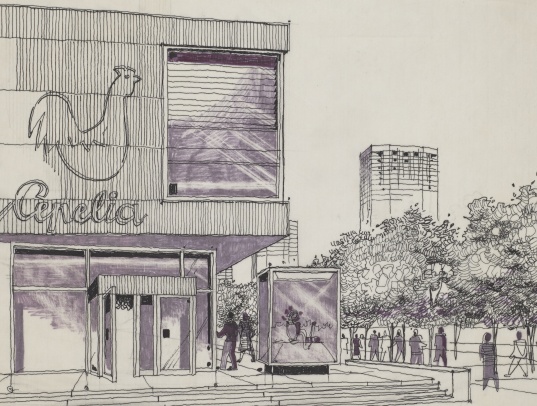
Cepelia pavilion, drawing by Zygmunt Stępiński, tracing paper, ink, marker, c. 1965, collection of the Museum of Warsaw
October, 13 – November, 11
Cepelia pavilion, Marszałkowska 99/101, Warsaw
The modern city can be described as a never-ending attempt to deal with the other by rendering him/her as the neighbour. The notion of the neighbor signifies coexistence and alienation, love and hate, similarity and otherness. This word is critically overused in the official discourses of nation-state governments, which deploy it as a metaphor without taking into account its inherent ambiguity. Neighbours is also the title of a book that was used this year as grounds for approving a controversial law in Poland, prompting outbursts of antisemitism and anti-Ukrainian sentiments.
Like the inhabitants of other Polish cities, more and more Varsovians are discovering that their next door neighbours are Ukrainian. Or, for that matter, Belarusian, Moldovan, Russian, Georgian, or Uzbek. The growing influx of migrants from beyond the eastern border means that, for the first time since the end of World War II, Poland is ceasing to be a mono-ethnic state.
The tenth edition of WARSAW UNDER CONSTRUCTION responds to this situation by rupturing the logic of the festival in a way that reflects the changes taking place in Polish society. Instead of talking about the growing community of migrants from east of the border through the objectifying, aloof medium of artistic representation, the festival is being taken over by a group of newcomers from Ukraine (just as, in the imaginations of some of the public, migrants from this country are now “taking over” jobs, institutions and neighbourhoods in many Polish cities).
The surge of migration from Ukraine to Poland is not ocurring on a one-way street. It is profoundly changing the economic, political and social realities of both countries. This year’s edition of the festival therefore straddles the two Eastern European capitals that embarked on two strikingly different paths of development after 1991.
In Warsaw, the “Neighbours” exhibition, curated by the Kyiv collective Visual Culture Research Center, will take place in the modernist, post-war structure known as the Cepelia pavilion. The original building housed a public institution aimed at cultivating a new model of Polish national identity. In the decades following the dissolution of the Warsaw Pact, this venue served, symbolically enough, as a gaming parlor. In Kyiv, the festival will be held in an area that is one of the most striking products of the social and urban collapse of the 1990s. Once a lively route connecting downtown Kyiv to the Upper City, Petrivska Avenue in central Kyiv has become a no-man’s-land following a series of geological and social disasters.
The two cities where the Neighbours project unfolds will converge in Warsaw at the exhibition space in Cepelia. A number of works on display at the exhibition will deal with the many ways in which the notion of architecture, and the position of its creators, is being transformed by local and transnational market mechanisms, and by past and present political ideologies.
In this project, the idea of “neighbours” is envisaged in a state of constant flux, precarity and transformation, rather than permanent, stable co-existence. This opens up a perspective on the ongoing flows of migration in European сities and beyond, often misleadingly described as the “migrant crisis.” Special attention is given to the ideological battle that is emerging in the public space of the city, exposing the new rise of ethnic hostility and attempts to establish a right-wing monopoly on history.
“Neighbours” is a gender-neutral term in English, while the Polish word “sąsiedzi” has a masculine form and therefore is a linguistic manifestation of male power, a symbolic way of introducing the underrepresented, invisible involvement of women in the processes of shaping and using urban spaces, with a special focus on the gendered labor performed by female migrants from east of the Polish border.
Participating Artists: Babi Badalov, Oksana Briukhovetska, Oleksandr Burlaka, Oleksiy Bykov, Davyd Chychkan, Phil Collins, Kseniya Hnylytska, Nikita Kadan, Taras Kamennoy, Gal Kirn & Fokus Grupa, Dana Kosmina, Marginal Act, Marina Naprushkina, Valentyna Petrova, Aleka Polis, Serhiy Popov and Mykola Ridnyi, Oliver Ressler, Santiago Sierra, Anna Sorokovaya, Hito Steyerl, Łukasz Surowiec, in collaboration with Marta Romankiv & Oleksandra Ovsyannikova, TV Kryzys, Piotr Wysocki, Alina Yakubenko, Florian Yuriev, and Artur Żmijewski.
Curators: Visual Culture Research Centre.
The WARSAW UNDER CONSTRUCTION 10 Festival is co-organized by the Museum of Modern Art in Warsaw and the Museum of Warsaw. The project owes to the funding from the Capital City of Warsaw. More information: https://wwb10.artmuseum.pl/en.


![]()
NEIGHBOURS Urban Project in Kyiv. Program of Events:
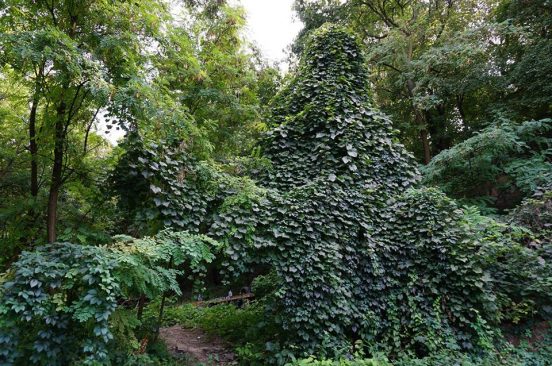
September 16 – 28, 2018
16 September, 12:00 Botanical Workshop with Anastasia Kolenkova
During September 16-19, we invite you to the Botanical Workshop of the green space worker Anastasia Kolenkova. Participants will explore possible ways of coexistence of people and local plants and try to create a landscape design that won’t disrupt the existing harmony.
19 September, 18:00 The Tour to Petrivska street (meeting at Lvivska sq. next to the Billa shop)
Sasha Burlaka will tell about layering of urban contexts around the Yar area, about its history, some old and new elements and objects which disappear and emerge again. Formografia design studio, along with participants of the 5-day master class, will briefly talk about the results of their work with use of exclusively those building materials they have found in the area. They will tell about wood and metal constructions that correspond to the requests for the infrastructure for the local community.
20 September, 19:00 Mattia Pretolani Figures of the Negative: Elements for an Architecture of Contradiction
In his Negative Dialectics, T.W. Adorno theorised philosophical dialectics in order to persist in a state of contradiction, avoiding resolutions within affirmative-wise actions. Would it be possible to translate these precepts to the architectural and design practice?
21 September, 19:00 Agency of architecture. Small projects by Tomasz Świetlik
In the talk Tomasz will present some of his work including Stage, Świetlica Matejki, Spectacle Square, and some small projects like Sandthing (sculpture in the info photos). He will talk about how they have been designed and how they work.
22 September, 17:00 Zakeep party and Graffiti battle
23 September
12:00 DIYstvо festival
14:00 Anarchitectural communas, a lecture by Dana Kosmina
The participatory construction and creation of new communities that are independent of the state administration are quite hidden from the general urban view. Places of absolute freedom, where there is no vertical distribution of power and there is a domination of laws of self-organization, become a kind of exotic islands situating far from the urbanized continent.
Dana Kosmina is an architect and artist, co-founder of the city interventions open group Pylorama. From 2017 member of Hudrada curatorial group. From 2017 co-founder of DA style union of the modernist uniform creators.
16:00 Concert
28 September, 20:00 Landslide XL (2016/18) (dir. Oleksiy Radynski) screening
Film about an attempt to build “a society, which will be radically different from everything else that surrounds us”). This attempt is taking place in the very center of the Kyiv city, in the area reclaimed by the forces of nature. Landslide, degradation of urban politics and disintegration of social ties led to the emergence of anarchic, uncontrolled enclave in the city.

![]()
![]()

